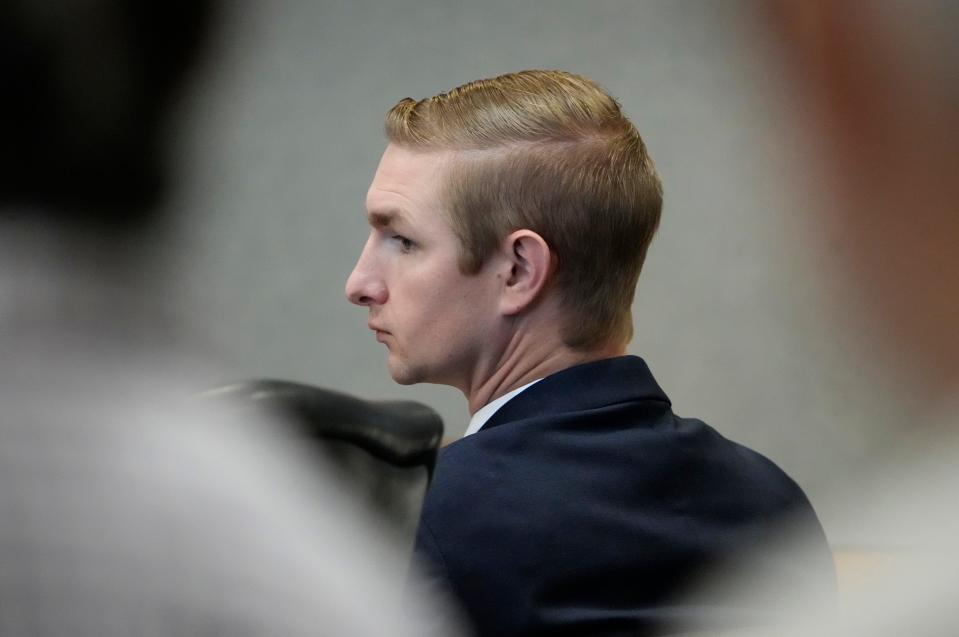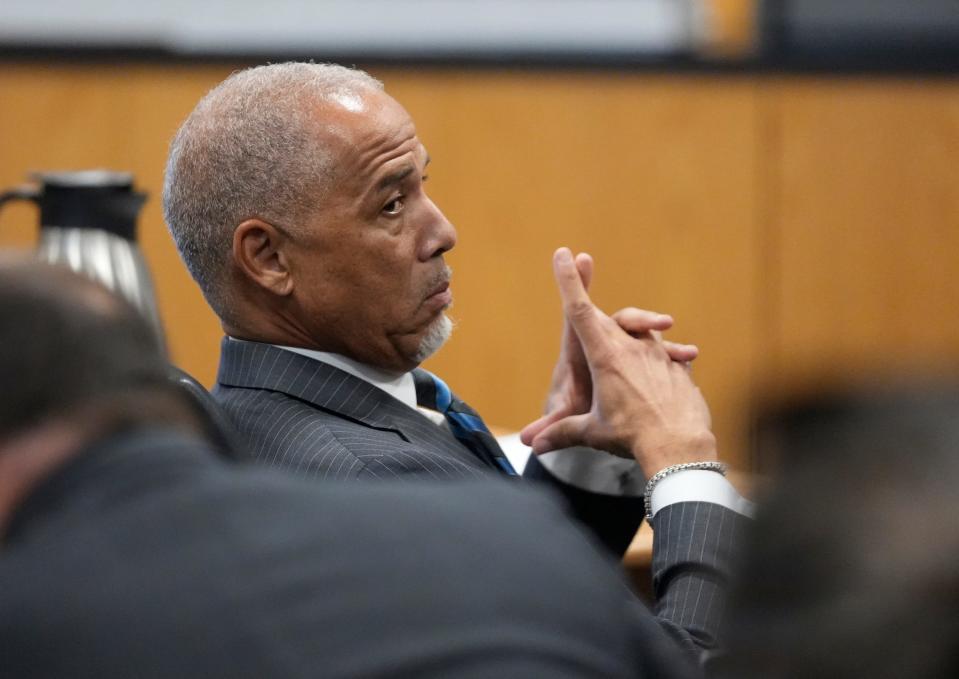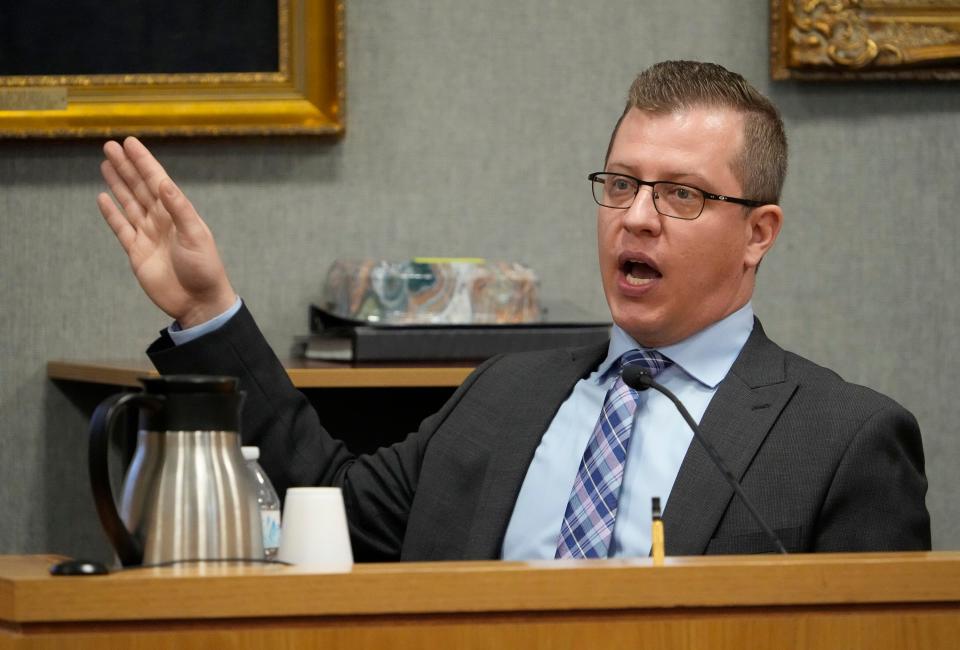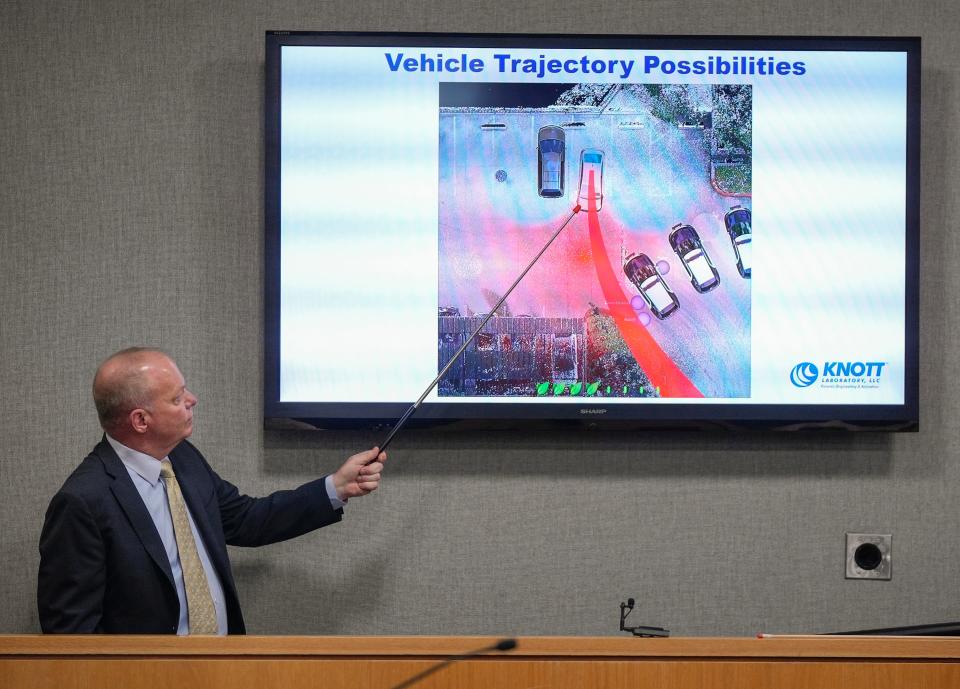Closing arguments in Austin police officer trial reiterate far-reaching impact
Austin police officer Christopher Taylor, on trial for the April 2020 shooting death of Michael Ramos, is believed to be the first Austin police officer charged with murder for an on-duty use of force.
Prosecutors from the Travis County district attorney’s office have argued that Taylor’s use of lethal force was unjustified and in defiance of police protocol.
Defense attorneys have argued that, based on his perception at the time, Taylor feared for his life and the lives of other officers present.
The trial began Oct. 23 and, on Tuesday, prosecutors and defense attorneys presented their closing statements.
The jury will begin deliberations Wednesday. In order to convict or acquit Taylor of murder, the jury must vote unanimously.
Check back for continued updates on the trial against Taylor this week.

In closing arguments, attorneys emphasize far-reaching impact of a conviction
Jurors have heard 11 days of testimony, and, on Tuesday morning, they paid a visit to the parking lot of the Southeast Austin apartment complex where Ramos was shot and killed.
Prosecutors have been careful not to condemn the Austin Police Department or police officers at large. During his closing statement, Dexter Gilford, head of the district attorney’s Civil Rights Unit, told jurors they would do "no disservice" to the profession by convicting Taylor.
Defense attorneys, however, argued that the prosecution attacked officers on the witness stand and that a conviction would have a chilling effect on officers responding to 911 calls.
In their closing arguments, defense attorneys also questioned prosecutors’ conduct. They suggested that prosecutors deliberately kept evidence from the jury, including footage from one officer’s patrol car camera.
Prosecutors had the last word in the trial. In the state’s final attempt to make their case, prosecutor Gary Cobb situated Ramos’ death amid a broader historical context of racial violence and the fight for civil rights in the United States.
Cobb said that cases of officers shooting civilians used to be resolved quickly. The "good hero" police officer would have been believed over "vilified and marginalized" citizens. But, Cobb said, juries are now more representative of their communities and they can use video footage in making their decisions.
Quoting Martin Luther King Jr., Cobb said, “The arc of the moral universe is long, but it bends toward justice.”
“That’s what we’re asking for in this case — justice for Michael Ramos,” Cobb told jurors.

A battle of experts
Defense lawyers have presented experts on forensic engineering and cognitive psychology, who have attempted to rebut some of prosecutors’ most persuasive points.
On Monday, jurors heard from David Gilden, a professor of psychology at the University of Texas. Gilden’s testimony speaks to the heart of defense attorneys’ argument that Taylor’s use of deadly force is justified based on his perception.
Both prosecutors and defense attorneys have played lengthy excerpts from body-worn cameras and patrol vehicle cameras. But Gilden described video footage as “misleading.” In preparation for his testimony, Gilden said that he had reviewed Taylor’s written statement and some video, but he couldn’t remember what specifically.
He said that the “critical issue” at hand is what “visual information” was available to Taylor immediately preceding the shooting.
Citing his research experience in psychology, Gilden said that Taylor’s field of vision would have been “very limited,” given that he was aiming his rifle.
Prosecutor Gary Cobb asked if Gilden’s view was that Taylor was “so focused” on “accomplishing his goal of killing Michael Ramos” that he was not aware of what direction the vehicle was traveling in.
Gilden agreed.
Defense attorneys seemed intent on addressing earlier claims made by the state’s policing expert, Seth Stoughton. Last week, Stoughton said that officers shouldn’t be so “fixated” on their target that they “lose sight” of the broader situation.

Jurors also heard from Henry Mowry, a forensic engineering expert who presented his own digital rendering of the shooting from Taylor’s perspective through the rifle scope. In Mowry’s reconstruction, the view beyond the circle of the scope was blurred.
Mowry described what he thought were inaccuracies in the state’s reconstruction, which was prepared by Visual Law Group and presented in court during the first week of the trial. He said that the state’s rendering had misrepresented the location of a minivan to the left of Ramos’ vehicle.
Defense attorneys also presented a rendering of the possible trajectories of the Prius, based on its turn radius. Prosecutors were quick to point out that the rendering did not represent the actual path of the car.
Mowry, who prosecutors argued did not have sufficient expertise to testify, said he had worked on just one other digital reconstruction of a shooting.

This article originally appeared on Austin American-Statesman: Austin police officer trial nears end as lawyers give closing arguments

